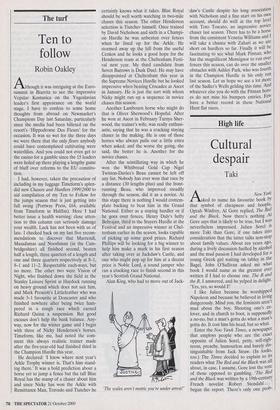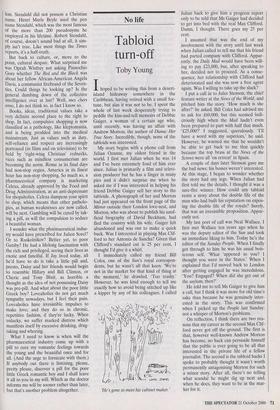High life
Cultural despair
Taki
ked to name his favourite book by that symbol of cheapness and hoopla, Oprah Winfrey, Al Gore replied, The Red and the Black. Now there's nothing Al Gore says that is likely to be true, but I was nevertheless impressed. Julien Sorel 15 more Taki than Gore, if one takes into consideration that the latter talks non-stop about family values. About ten years ago, during a lively discussion fuelled by alcohol and the mad passion I had developed for a young Greek girl waiting on tables in the Bagel, John O'Sullivan asked me what book I would name as the greatest ever written if I had to choose one. The R and the B, I answered, and he yelped in delight. `Yes, yes, so would I!' I like Julien because he worshipped Napoleon and because he believed in living dangerously. Mind you, the feminists aren't mad about the boy. Shooting one's ex- lover, and in church to boot, is supposedly a no-no, but a man's gotta do what a man's gotta do. It cost him his head, but so what. Enter the Noo Yawk Times, a newspaper that employs people who are the exact opposite of Julien Sorel, petty, self-righ- teous, preachy, humourless and barely dis- tinguishable from Jack Straw. (In looks, too.) The Times decided to explain to its readers what The Red and the Black was all about, in case, I assume, Gore lost the vote of those opposed to gambling. 'The Red and the Black was written by a 19th-century, French novelist Robert Stendahl .. • began the report. There's only one prob- km. Stendahl did not possess a Christian name. Henri Marie Beyle used the pen name Stendahl, which was the most famous of the more than 200 pseudonyms he employed in his lifetime. Robert Stendahl, of course, doesn't sound bad at all, it sim- ply isn't true. Like most things the Times reports, it's a half-truth.
But back to culture, or, more to the point, cultural despair. What surprised me was Oprah Winfrey not asking Pinnochio Gore whether The Red and the Black was about her fellow African-American Angela Davis, a communist firebrand of the Seven- ties. Could things be looking up? Is the general dumbing down of the collective intelligence over at last? Well, mes chers amis, I do not think so, in fact I know so.
Books, ideas, traditional values take a very definite second place to the right to shop. In fact, compulsive shopping is now classified as a pathology, like kleptomania, and is being prodded into the medical mainstream. Just as values such as duty, self-reliance and respect are increasingly portrayed (in films and on television) to be held by 'right-wing Christian' rednecks, vices such as mindless consumerism are becoming the norm. Rome in its final days had non-stop orgies, America in its finest hour has non-stop shopping. So much so, a pharmaceutical company is marketing Celexa, already approved by the Food and Drug Administration, as an anti-depressant for shopaholics. Celexa dampens your spirit to shop, which means that other patholo- gies, as human weaknesses are now called, will be next. Gambling will be cured by tak- ing a pill, as will the compulsion to seduce a beautiful woman.
I wonder what the pharmaceutical indus- try would have prescribed for Julien Sorel? Or to Raskolnikov? Better yet, to poor Gatsby? He had a lifelong fascination with the rich and privileged, seeing their lives as exotic and fanciful. If Jay lived today, all he'd have to do is take a little pill and, presto, Daisy and her friends would begin to resemble Hillary and Bill Clinton, or Cherie and Tony Blair, as horrible a thought as the idea of not possessing Daisy was pre-pill. And what about the poor little Greek boy? Loveaholics do not get much sympathy nowadays, but I feel their pain. Loveaholics have irresistible impulses to make love; and they do so in chronic, repetitive fashion, if they're lucky. When unlucky, we suffer marked distress which manifests itself by excessive drinking, drug- taking and whoring.
What I need to know is when will the pharmaceutical industry come up with a pill to cure my romantic feelings towards the young and the beautiful once and for all. (And the urge to fornicate with them.) If anybody out there is listening, please, pretty please, discover a pill for the poor little Greek romantic boy and I shall leave it all to you in my will. Which as the doctor informs me will be sooner rather than later, but that's another problem altogether.


























































































 Previous page
Previous page